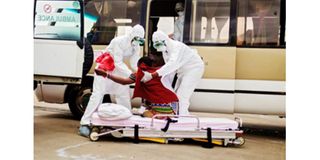EAC launches regional emergency reserve to combat infectious diseases

What you need to know:
- The reserve’s first deployment will be to the South Kivu region of the Democratic Republic of Congo (DRC), where experts will work alongside the German Disease Outbreak Preparedness Team (SEEG)
Arusha. The East African Community (EAC) has officially launched a regional emergency initiative aimed at strengthening the bloc’s capacity to respond to infectious disease outbreaks.
Called Rapidly Deployable Expert (RDE) Reserve, the initiative is a cornerstone of the organisation's strategic plan to bolster public health responses and mitigate the impact of outbreaks such as M-pox and Marburg virus disease, which have plagued several member states, according to EAC secretary general Veronica Nduva.
“The RDE reserve is composed of more than 140 experts from across EAC member states, including health professionals, disease specialists and logistics experts,” said Ms Nduva at the launching ceremony on Saturday November 16, 2024.
She added that the establishment of the reserve was the culmination of years of collaboration between the EAC secretariat and key technical and financial partners, including Africa Centres for Disease Control and Prevention (Africa CDC), the US Centres for Disease Control and Prevention (US CDC), the World Health Organisation (WHO), and the German government.

“The partnerships have enabled the creation of a multidisciplinary regional response system, ensuring that all aspects of outbreak management are addressed, from healthcare provision to risk communication strategies,” she said.
Ms Nduva announced that the reserve’s first deployment will be to the South Kivu region of the Democratic Republic of Congo (DRC), where experts will work alongside the German Disease Outbreak Preparedness Team (SEEG).
“The team will focus on training healthcare workers from the DRC and Burundi in infection control, preventive measures and risk communication for M-pox and other infectious diseases,” she said.
Germany, through its international development agency GIZ, donated personal protective equipment (PPE) for healthcare workers and provided €500,000 to support the initiative.
Head of the East Africa Department at the German Ministry of Economic Cooperation and Development (BMZ), Mr Marcus von Essen, said the aid aims to help EAC member states respond swiftly and effectively to infectious disease outbreaks.
“Our objective is to minimise the impact of these diseases, particularly in terms of deaths, physical deterioration, and the disruption of the region’s development and economy,” he said.
The DRC ambassador to Tanzania, Mr Louis Kisombo Manzombi, expressed gratitude to the EAC and its partners for their support in combating M-pox, which has affected over 7,000 people in the region, 40 percent of whom are children.
“The collaboration between member states and international partners is vital in addressing these pressing health challenges,” Mr Kisombo said.




